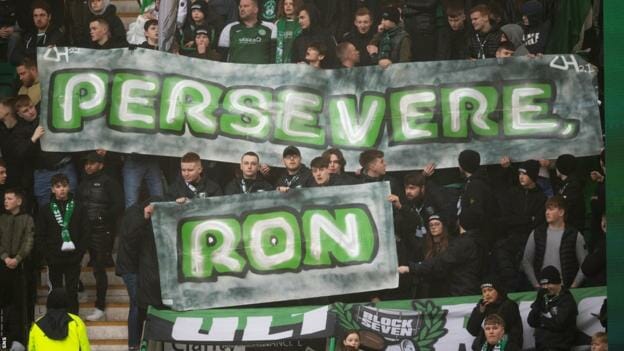

One evening last year, in the dog days of the Shaun Maloney season, the phone rang and the voice at the other end of the line introduced himself as ‘Ron Gordon of Hibs’.
You tend to brace yourself in situations like that. You think of all the criticism you directed at his team’s performances, and his decision-making at the top of the club, and prepare for a volley. The commentary around Hibernian had been edgy. They had just been done at home by St Mirren, a loss that had come hot on the heels of a home defeat to Livingston.
The team was a mess and Gordon was brutally honest about his role in that. He wanted stability but his decision to sack Jack Ross brought turbulence. He didn’t argue with the view that he may have acted hastily both in Ross’ dismissal and in Maloney’s appointment.
Gordon came on the line not to complain about the coverage or to absolve himself from blame, but to talk, to give a bit of insight from his perspective, not just on the state of Hibs but on the landscape of Scottish football in general. He was gentle, classy and completely fascinating.
Large parts of Gordon’s back story were known but there were gaps and he was happy to fill them. His early years in Peru, his move to America at the age of 15, his education in Australia, his first steps in broadcasting with a rented camera and little films he made that he sold for a grand a time when he was lucky.
The word he kept using was “potential”. Sometimes, when newcomers to the harsh terrain of Scottish football start talking this way the first thing that has to be done is a background check to see if they’re the real deal or just another spoofer.
Gordon was the real deal. He saw potential in creating television and radio stations for Spanish-speakers in America and he wasn’t wrong. He built ZGS Communications from scratch and, across a span of 30-plus years, his company won buckets of media awards. When the time to sell arrived he did a deal with Comcast/NBC Universal for $200m.
He saw potential in creating a community bank in Washington DC and he founded one that built assets of $1.4bn.
He saw potential in Hibs, too. And in the Scottish game. He thought that both were long-haul projects but he was convinced that there was success to be had. Success was Hibs finishing in a European place in the league. Success was regularly qualifying for the group stages of European football. Success was entertainment and a feel-good vibe at a packed Easter Road.
There was a ton of other stuff around television markets and brand identity and selling the game better than it was currently being sold. Coming from somebody else, it might have gone in one ear and out of the other, but this was a guy who had done it before in his own world, so you listened.
He wasn’t slamming anybody, but he thought that serious growth was possible. How long it would take to achieve that growth, he couldn’t say, but his belief, and his background, made you want to park the natural scepticism. It was ambition rooted in reality. He came across as a seriously interesting man.
‘Gordon would have got there… he always did’
Three weeks ago, Gordon announced he had cancer. On Tuesday, the news came through that he had died. The suddenness of it was shocking. The tributes, as you’d expect, have been widespread. People across the game in this country could tell of his passion and his drive to improve the football landscape in Scotland. In an environment where negativity so often rules, he tried to offer a vision. His peers respected him for that.
He instigated a strategic review of the SPFL through Deloitte in an attempt to find some opportunities that the game was overlooking. There was no Eureka! content in the report, no get-rich-quick brainwaves, but it needed to be done all the same. It was a thorough piece of work and you got the sense that it was just the start for Gordon and other like minds.
On his watch, Hibs pulled up no trees. They finished fourth and fifth in the two seasons before his arrival and then seventh, third and eighth in the three after. Managers came and went, first Paul Heckingbottom, then Ross, then Maloney. Players moved through a rapidly revolving door. He knew that things haven’t been all that good, but he always believed that they would get better.
Currently Hibs are in fourth and on their longest unbeaten run since August-September 2021. Modest growth, but growth nonetheless. For all the understandable praise heaped on their city rivals for recruitment and results, most notably in the derby matches, Hibs are only five points behind Hearts in the league table despite having Martin Boyle unavailable since October and Kevin Nisbet available for just eight league games so far this season.
Ryan Porteous, another totemic player, left for Watford last month and yet Hibs have won three and drawn one of their four games since then. It’s far too early to say that they’ve turned a corner, but the tragedy is that Gordon will not be around to see what happens next.
A person who knew him well had this to say on Tuesday. “He had an innovative mind as his background shows. Hibs haven’t been anywhere close to where he wanted them to be, but I’m a thousand per cent certain that he’d have got there in time. Look at the story of his life. He always did.”







